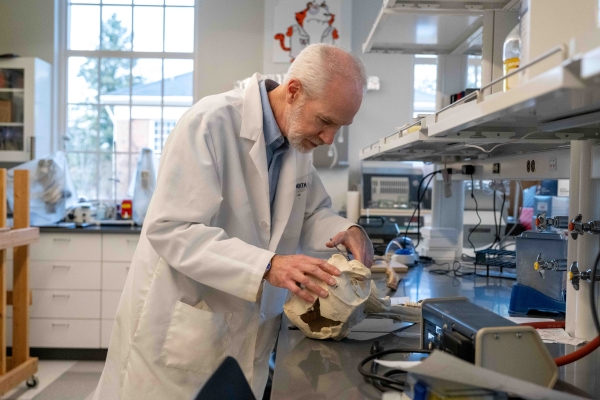 Hampden-Sydney benefits from the dedication of our esteemed faculty members to continually advancing their fields through groundbreaking research. Their efforts not only enhance the reputation of the College but also directly benefit students by fostering a dynamic learning environment enriched with detailed insights and subject matter expertise. Patterson Professor of Biology Alexander Werth is at the forefront of this effort. Werth recently published two journal articles and two book chapters on the anatomy of whales, dolphins, and porpoises, with a focus on how the skull, jaws, teeth, and tongue relate to feeding.
Hampden-Sydney benefits from the dedication of our esteemed faculty members to continually advancing their fields through groundbreaking research. Their efforts not only enhance the reputation of the College but also directly benefit students by fostering a dynamic learning environment enriched with detailed insights and subject matter expertise. Patterson Professor of Biology Alexander Werth is at the forefront of this effort. Werth recently published two journal articles and two book chapters on the anatomy of whales, dolphins, and porpoises, with a focus on how the skull, jaws, teeth, and tongue relate to feeding.
“I find research very rewarding because it satisfies my innate curiosity,” Werth said. “With every answer I uncover, it creates a multitude of more questions, guaranteeing an abundance of future research to explore.”
Since the age of eight, Werth has had a keen interest in the anatomy of whales, dolphins, and porpoises. Having joined the College in 1992 and participated in various forms of research, he attributes his passion for research to his ability to delve deeply into topics, uncovering comprehensive insights beyond simple explanations. This often involves collaboration with colleagues, who offer their expertise from different viewpoints.
“One of the most interesting tidbits about science is the opportunity to collaborate with others,” Werth said. “One of the articles I recently co-published was with my graduate advisor, who is 96 years old! It was the first time we have published a major piece together, and I thought it was a perfect opportunity to collaborate and show him how much I have learned.”
Werth collaborated with his graduate advisor and former director of Harvard’s Museum of Comparative Zoology, A.W. Crompton, on "Cetacean tongue mobility and function: a comparative review," published in the Journal of Anatomy. He also worked with Brian Beatty, a paleontologist colleague and anatomy professor at the New York Institute of Technology College of Osteopathic Medicine, on an article titled “Osteological correlates of evolutionary transitions in cetacean feeding and related oropharyngeal functions,” published in Frontiers in Ecology and Evolution. Additionally, Werth contributed to two book chapters published by Springer Publishing: "Convergent evolution of secondarily aquatic feeding in mammals," featured in Convergent Evolution, and "Skulls, teeth, and sex," co-authored with two colleagues from New Zealand’s University of Otago, which appeared in Sex in Cetaceans: Morphology, Behavior, and the Evolution of Sexual Strategies.
 Being able to publish a wide range of works, spanning from articles to book chapters, marks a significant achievement. Werth finds fulfillment in consistently advancing multiple facets of his research, discovering correlations that enrich our understanding of human dental anatomy, which has a lasting impact on future research and classroom education.
Being able to publish a wide range of works, spanning from articles to book chapters, marks a significant achievement. Werth finds fulfillment in consistently advancing multiple facets of his research, discovering correlations that enrich our understanding of human dental anatomy, which has a lasting impact on future research and classroom education.
“I believe this research holds significance, offering not just answers for classroom needs, but also crucial questions,” Werth said. “At Hampden-Sydney, the scholarship and teaching go hand in hand, and I believe demonstrating the value of curiosity to my students and colleagues can be motivating and inspiring."
As research constantly evolves, Werth stands at the forefront of collecting and understanding new information, sharing it with his colleagues and students to advance their knowledge. Through his tireless pursuits and his unwavering dedication, Werth exemplifies the essence of academic excellence and the spirit of inquiry that drives progress.
“My ultimate goal is to find answers I can share with people,” Werth said. “Having understood that the scientific process includes sharing one’s findings, I take great pleasure in spreading valuable information that may encourage deeper exploration.”
Read the full academic articles:
“Cetacean tongue mobility and function: A comparative review”